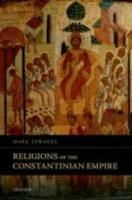
OUP (2018) p/b 365pp £30.00 (ISBN 9780198785248)
Though Christian individuals and groups might have known what it was they believed, there can have been little understanding of what it would mean to have a new religion, amongst many others new and not so new, home-grown and imported, all overseen (as episkopos) by a Christian emperor, and how this would fit into, or around, the fragmented religious and philosophical environment into which it was born. The new environment, including Christianity, would need some shaping, and some agreement, at least on the part of the Christians, on what each other thought, and an idea of where the dividing lines lay. The philosophers, it seemed, couldn’t care less.
And who were these believers anyway? The fact that the global desert heaved with ‘the alternative’, the rather social monks and slightly more isolated stylites, did little to alter the sense that the religious and philosophical debate was one for the metropolis. Porphyry and Plotinus figure large. The precious certainty in these uncertain times came from what would always be the clinching argument for the Christian—it was all about Divine Providence.
The book is divided into three parts. The first, ‘Philosophical Variations’, looks at the interchanges between Christian writers and their Greek(ish) philosophical opponents (whose undoubted star was Plato), and the key concepts that unite and divide.
The second, ‘Religious Plurality’, considers cults spoken of as possible rivals to Christianity, some of which, like Mithras, Cybele and Isis, were on the way out anyway. Nor can we say that such decline came from a kind of critical mass that Christianity had assumed and was crushing others (estimates of a Christian population in the empire of ten percent are common). The ‘Religions of Transformation’ of Chapter 7 were more successful, and though their offering of eternal life from internal transformation (Manichaeans and Gnostics, for example) did not have the heft of Christianity, bits did accrete to the more favoured proposition. As for Judaism, Constantine did not expect anyone to abandon Mosaic law, but he was determined that ‘no one would become a Jew who had not been born a Jew’.
The third part directs our attention towards what Constantine’s idea of establishment did to Christianity. E. is sure that his actions showed him professing the new faith, though in his position as episkopos he oversaw the interests of all his people, and pagan sacrifice all but ended in the fourth century (whether he enacted that law or not). But was the Eucharist a continuation of sacrifice in another guise? There was no blood shed, but, symbolically, the blood and flesh of God were ingested. E. concludes: ‘The Eucharist … took over at least one function of sacrifice—the consecration of a public space in which all classes and sexes met to affirm their dependence on, and loyalty to, a common social order.’ So the Eucharist has been well distanced from sacrifice pagan and Jewish. Nevertheless, neither Testament had been settled as canonical by the time of Constantine’s ‘momentous commission’ of fifty Bibles from Eusebius for the use of the bishop of Constantinople, and consensus would still be needed on a range of other issues, including what was literal and what allegorical, and what was the official line on the nature of Christ, the conclusion to which led Bishop Arius into heresy.
And so Constantine understood his duty and did his best. The fact that within such complexity not everything stayed neatly tied up, and that many other things became unravelled in later times, cannot rightly be laid at his door, and E. is remarkably successful at ordering this diverse and complex material into a comprehensible whole, writing in a style that is elegant, precise (though OUP need to be aware of the number of proofing errors), urbane and sometimes funny (‘Arnobius relates the following version [of the myth of Attis] on the authority of Timotheus, a Hellenistic poet of little charm and caliginous learning’. Plenty of charm and no caliginosity here, though.
Adrian Spooner
